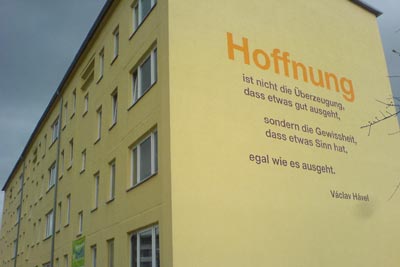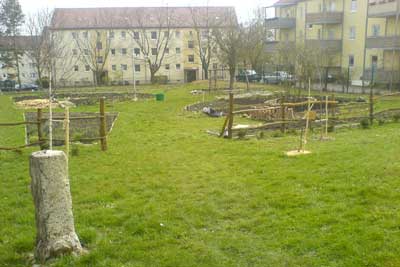home > artwork > wheat project / weizen projekt
overview : thesis proposal : blog
|
Wheat Project / Weizen Projekt This is a work in progress. The original concept is as follows. For the past few years there has been an organic garden behind the Obdachlosenheim Weimar. A group of residents, social workers and their friends work in the garden on Saturday mornings. Then they all eat lunch together, and when there is food from the garden they eat that. I want to invite people who buy organic food from the local organic farmer on the market plaza and from the bio laden to come to the Obdachlosenheim and work in the garden and eat the food from the garden together with the residence. But how is that any different from what has been happening for the past 2 year? I want to institute a tradition/ceremony/ritual within the already existing structure of the garden project at Obdachlosenheim Weimar. That tradition would be to plant wheat, harvest it, grind flour, and bake bread. I want to plant a wheat field as an artistic intervention. You don't expect to find a wheat field in a vegetable garden in the city. It makes absolutely no economic sense to grow wheat on such a small scale. People know that, at least subconsciously, that it makes no economic sense and that something is out of place. If they think about it they will realize there must be some other reason why someone is growing wheat, there must be some meaning. It is a symbolic reason. It is in some way related to the non-economic exchange on the markt platz with Eckhard and in the Bio Laden. What I am referring to is the fact that you can buy organic foods cheaper at places like Hercules. It symbolizes something. It is a symbol of agriculture, and of the unity of all humans as we all must eat, we are all made of flesh and blood. As a symbol of the fact that on a fundamental level we are all equal/the same because no matter who you are you must eat, so we are all connected by food. A symbol of our shared humanity. Wheat is a good symbol of this because it is one of the first cultivated crops (if not the first crop), a basic staple food, and a symbol of agriculture in general. The domestication of wheat brought in the move from hunter-gatherer societies to agricultural societies, which brought with it the division of labor and complex social hierarchy. The social hierarchy that I am then questioning and challenging. I want to remind people that these social hierarchies are not inherent in us, but were invented with agricultural society are constructed. I would also like to serve the bread at the end of the year Erntedankfest, which is a festival in the fall with live music and people from the larger community. There is also a bit of role reversal, to be fed by the homeless instead of feeding the homeless. To break down the normal social hierarchy and power structure. To contradict peoples patterned response to homeless people that says that they are helpless. To get people to see the humanity in every human, and ultimately to see their own humanity because in separating ourselves and oppressing others we loose a part of our humanity.
Notes and random thoughts: Wheat vs. other plants In addition to baking bread the wheat seeds could be passed on to other people as an artifact and agent of the project/idea. In addition to passing them on for the next year Obdachlosenheim garden I could pass them on to the community at large with this message connectedness and equality. I would ask people to plant the seeds the following year and think about these ideas and continue the project and the tradition sharing the bread and the seeds as a ritual to remind us of what we lost when we gained agriculture, what we gave up in exchange for civilization. But also with the hopeful message of seeing the humanity in every human. Of course the use of bread as the body of Christ in the communion is an old symbol familiar to anyone in western Judeo-Christian culture. It is meant to unite people and in a way say that we are all the same, we are all of the same body and blood. But bread is older than Christ and my reference goes further back as well. |

